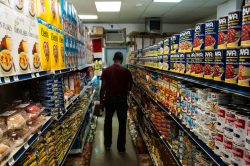
SNAP (the Supplemental Nutrition Assistance Program) is facing serious threats at the Arkansas Capitol this year. Despite all the good it does (keeping thousands of kids from going hungry, encouraging work, and acting as an economic safeguard to name a few), multiple bills would inhibit people from accessing the program. These bills are, at best, misguided attempts to improve SNAP. At worst, they are intentionally punitive and built on misunderstandings about how the program works. There are quite a few, but they generally fit into three categories.
- Fraud prevention that does more harm than good: The vast majority of SNAP beneficiaries are honest people who are experiencing hard times (the fraud rate for SNAP is only three percent. a good score compared to other programs). But no fraud is good, and there have been some great ideas to reduce fraud over the years. Introducing PIN numbers for EBT cards, for instance, helped reduce fraud rates without damaging the program. However, many fraud prevention ideas aren’t good, and can end up harming the broader population of honest people instead of deterring a few crooks. The following bills, unfortunately, fall into the “more-harm-than-good” category:
- HB1903– This bill duplicates many of the verification processes already in place. It would be an unhelpful bureaucratic mess and it would make it harder for people to apply for SNAP. The bill also eliminates a type of eligibility that isn’t applicable to Arkansas (suggesting it is cut-and-paste legislation from another state or national group, not a thoughtful response to our state’s needs).
- HB2149– This bill requires users to show ID when making purchases with a SNAP card. Because of federal regulations[i] that require SNAP and non-SNAP customers to be treated the same, this would cause a lot of problems with grocers. It would also make it harder for people who need help to use the program. Read more about how ID requirements have failed in other states here.
- HB1904– This is a shell bill so far, but would also presumably have similar SNAP ID requirements. (HB1035 was amended to also include an ID requirement, you can read an analysis of that bill here).
- Bills that don’t trust people to make food choices for their families: Low-income families face all kinds of hurdles that other families don’t. Instead of improving access to fresh fruits and vegetables in food deserts, or increasing nutrition education, many bills simply punish families for buying the “wrong” kinds of food.
- HB1035 and HB2148– These bills both prohibit SNAP users from purchasing certain “luxury” or “junk food” items. Defining foods as “good” or “bad” is a huge obstacle – Does that granola bar have more fat than a candy bar? Does juice have more sugar than soda? Is that brand of gluten-free snack a “luxury” for a kid with an allergy? These types of bills are punitive and do nothing to improve public health. Instead, they make the program more difficult to use, and therefore discourage families in need from accessing a nutritionally adequate diet.
- Bills that limit who is eligible: When laws make it difficult or impossible for certain groups of people to access SNAP, it increases food insecurity in Arkansas and overwhelms local food banks. When food banks dry up, many kids and families don’t have anywhere else to turn when their pantries are empty.
- HB1462– This bill blocks future federal waivers that could improve access to SNAP (the Supplemental Nutrition Assistance Program). If we have another economic downturn, Arkansas won’t be allowed to apply for a waiver to help people stay on the program. Read more here. NOTE: This bill passed the Senate floor on March 13.
- HB2004– This bill would place additional barriers on parents who pay child support and add an administrative burden to agencies with no real benefit. This strategy has been abandoned by most other states that have tried it.
SNAP is the nation’s most important hunger prevention initiative. If you lose your job or can’t make ends meet, SNAP helps you fill in the gaps. The average monthly benefit is about $113 (or $1.26 a meal), and most people use the program for less than two years. Even if you’ve never used SNAP, you have benefited from the program because SNAP eases the effects of economic downturns. During the recent recession, thousands more people took up SNAP because of hard times, and those extra funds helped boost the economy. It is critical to all of us to keep this program intact.
[i] 7 CFR 278.2(b), 7 CFR 274.8 (f)(11)(ii)
